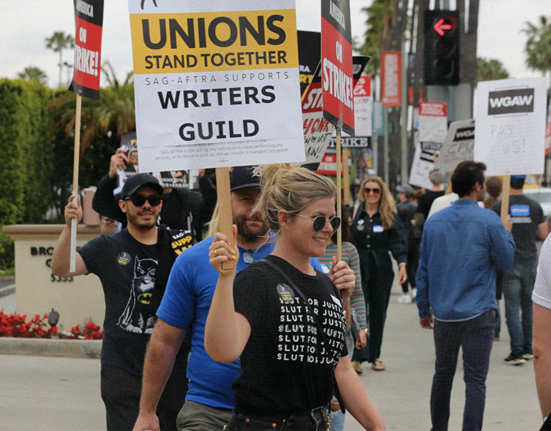LAST September 27th, the writer’s strike spearheaded by the Writers Guild of America (WGA) finally ended.
The incident, which lasted for 146 days, came as the second-longest strike ever to happen in the history of Hollywood, ending after the WGA, the Alliance of Motion Picture and Television Producers (AMPTP,) and a number of studios and production companies in Hollywood agreed to the terms of both parties.
Why was there a writer’s strike?
The protest action – known better as the 2023 Writers Guild of America strike – started on May 2, 2023, when the group, composed of over 11,500 screenwriters, launched a strike against the Alliance of Motion Picture and Television Producers due to a labor dispute arising at the time.
However, there were several reasons which mitigated the dispute.
Some of the demands of the writers include higher royalties, mandatory staffing within TV writing rooms, as well as reassurance of safety from the use of AI.
Residual payments were also a significant demand, due to the fact that more and more people had switched to streaming platforms – affecting the writers heavily.
It can be noted that shows now often have shorter seasons, which leads to smaller residual payments.
In short, the strike happened because writers all over America became fed up, prompting them to get the treatment they believed they deserved.
What did they win?
Following this development, Adam Conover, a member of the WGA’s Negotiating Committee, said the end of the strike meant the following victories for the writers of Hollywood:
- An assurance that a minimum number of writers are to be hired for every show, which will be based on the number of episodes that are in a season;
- A guarantee that comedy-variety writers will be paid the same in streaming as they are on TV;
- Provisions that will lead to higher pay for screenwriters, better pensions, and health plans for writing teams;
- And, for the first time ever – script fees for staff writers;
- Protections against AI, which ensures that this cannot be used to write or edit scripts, as well as undermine the rights and credits of actual writers.
Furthermore, Conover also notes that the writers were able to attain a success-based residual, which means that as more people watch a film or show through a streaming platform, the writer who helped to create it will also be paid with each stream.
“These are all things that they swore to us five months ago they would never give us in a million years, but we went on strike, and we hung together until they were forced to come to the table and meet our demands,” he said.
“We changed not just our industry for ourselves but for every writer who comes after us,” he added.
Meanwhile, there are still many issues that need to be dealt with, where production companies are still allowed to use AI, for example, but writers are allowed to sue them if their work is used to train any tech used for such purposes.
Aside from this matter, the actors’ and performers’ union strike is currently ongoing, as led by the Screen Actors’ Guild.
But at the very least, this is a great step in the right direction – hopefully, one that will lead production companies in other countries to follow suit, as well.
On the other hand, the matter will more likely affect the writers in the Philippines where local writers are said to be underpaid.
Why does this matter for the Philippines?
According to Jobstreet, the average monthly salary for a writer in the Philippines is around PHP22,000 to PHP32,000 per month. However, there’s no reassurance that the said compensation will be met. It can be noted that rates for freelancers or part-time writers are often even lower than the said bracket.
“It’s very low, even for Asia,” one Reddit user writes under the thread r/FreelanceWriters.
While another claims that in the Philippines, writers are often paid a peso per word, whereas other countries often charge five times more than that.
It was learned from a 2002 article from Butch Francisco that scriptwriters in the country are overworked and underpaid – all while gaining little to no artistic fulfillment from the scripts.
Director Pepe Diokno also shared the same sentiments way back in 2013, saying: “A big problem in the Philippines is that screenwriters are chronically underpaid. Our writers are struggling for peanuts.”
It is sad to note that little has changed, even as the world approaches 2024.
At present, seldom do writers like what they are putting out, which makes it even more frustrating that they are not even making enough to justify that.
Hopefully, the success of the WGA will help to affect and inspire the writers of the Philippines to finally realize what they are worth.
If there’s anything that this protest action has proven, it’s that the corporate bigwigs can’t do anything without you, no matter how much they might make you believe otherwise.









